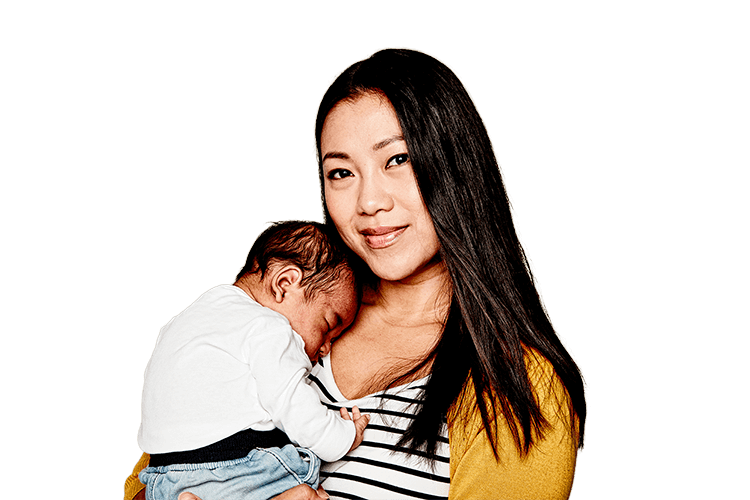This article was written in conjunction with Tresillian. Tresillian’s mission is to engage, educate and support families in Australia by increasing parenting confidence, leading to improved health and wellbeing of families with young children, and secure, resilient family relationships. For more information from Tresillian on baby sleep and settling please click here.

Every new parent understands that when a new baby comes along, there’s probably going to be lots of sleepless nights at first. But as the months tick by and so do the milestones, and parents’ group friends begin to report that their babies are sleeping right through the night while your baby isn’t, you might begin to worry. What are you supposed to do when baby is still waking up during the night after eight months, and even longer? And does it mean that something’s wrong?
The short answer – and the good news – is that this is absolutely normal, and there are definitely things you can do. According to Tresillian, who provide expert advice to thousands of tired parents of babies and young children each year, it’s all about understanding what’s going on, adjusting your expectations accordingly, and having a few simple techniques you can use.
Baby’s sleep and development
Your baby’s sleep is a developmental process that occurs over the first 12 months of life, just like their ability to walk and talk, says Fran Chavasse, Senior Nurse Educator. It’s controlled by your baby’s brain so neither you nor your baby can hurry it up too much; but you can help your baby by understanding how their sleep development occurs.
During the first 12 months most babies average 12 to 14 hours sleep over a 24-hour period. So, the amount of sleep stays the same, but as the year progresses more of your baby’s sleep will occur at night and less in the day.
Remember, though, that sleep development is a process, and every baby is different. Your baby has individual sleep needs just like you, so it’s good to learn how much sleep your baby needs.
Baby sleep times at 8 months and up
By 6-8 months your baby’s cycle is starting to change. Generally your baby will be more active during the day and may drop to two daytime sleeps as they stay awake for longer periods.
At 8 months and up, most babies are having two daytime sleeps morning and afternoon. If your baby becomes tired late in the afternoon, you may need to add a third short sleep.
Your baby may still be night waking or even start to wake at night: this can be due to separation anxiety which is quite normal for this age. If this happens, reassure your child and try to resettle with minimal fuss – see below.
What to do
When you’re not getting enough sleep, things can feel a little overwhelming, and like you have no control over the situation. But a little information and know-how can make all the difference.
Understand why babies cry
It might seem simplistic, but it can help for you to remember that most of the time babies cry for all kinds of things that aren’t necessarily serious – even when they’re crying like their life’s at stake! It could be hunger or having a dirty or wet nappy; they are lying in an uncomfortable position or have a pain in their stomach; or they simply want comfort from the people they love most. It may also be over-tiredness when baby’s “tired signs” have gone unnoticed and they become upset and distressed.
Recognise when baby needs sleep
The best defence is an early offence. First and foremost, this means making sure the rest of your baby’s day is organised around their sleep patterns – this includes feeding and socialising.
It also means learning to recognise your baby’s “tired signs” so that you can act quickly. Signs that your baby is getting tired and needs sleep include grimacing, yawning, grizzling, frowning, sucking, staring, snuggling in, jerky movements, becoming overactive, clenching fists, rubbing eyes, fussiness or crying. Responding early to these tired signs prevents your baby becoming distressed and makes it easier to get baby to sleep.
How to settle your baby
Because sleep is a developmental process, babies don’t “learn” to sleep. They do, however, need an opportunity to discover their own way of going to sleep. For babies over six months of age, Comfort Settling helps them do this while providing reassurance and support.
Comfort Settling a baby aged over 6 months (Steps 1-3)
- Talk quietly and cuddle your baby to help baby calm
- Put your baby on their back in the cot awake (calm/drowsy). Comfort your baby with gentle ‘ssshhh’ sounds, gentle rhythmic patting, rocking, or stroking
- As your baby calms or falls asleep, move away from the cot or leave the room. If your baby starts to become distressed, return and comfort your baby using step 2 before moving away or leaving the room again. Some babies may need you to stay in the room until they are asleep
When baby won't settle to sleep
- You may have to repeat the steps above several times before your baby is able to settle to sleep
- If your baby still does not settle, pick your baby up and cuddle until calm. Then either try steps 1-3 or get baby up and try again later
- As your baby learns to settle, it will take less time to calm your baby
Parental Presence (for babies over 6 months)
If your baby has never been separated from you at sleep time you may prefer this option.
- Talk quietly and cuddle your baby to help baby calm
- Put your baby on their back in the cot awake (calm/drowsy). Comfort your baby with gentle ‘ssshhh’ sounds, gentle rhythmic patting, rocking, or stroking
- Once your baby is calm, lie down or sit beside the cot within sight of your baby and pretend to be asleep
- If your baby remains awake, give a little cough or quietly say ‘ssshh time to sleep’ so your baby knows you are still in the room
- If your child becomes distressed do the least amount to calm your child (start with step 3 but you may need to start with steps 1-3 again) then lie or sit beside the cot
- You may have to repeat this several times before your child is able to remain calm and become drowsy or fall asleep
- Stay in the room until your child is asleep during the day and sleep in the same room as your child during the night
- Continue this for at least 1 week or until your child has 3 nights in a row of relatively uninterrupted sleep
- You can now begin to leave the room before your child is asleep
Other techniques to soothe your baby
- A cuddle or holding your baby close (this may include skin-to-skin contact)
- Rhythmical movement or walking
- Using a pram or sling
- Soft music
- A dummy
- A warm bath and/or baby massage
Unfortunately, some days your baby will find it very difficult to settle. No matter what you try, it does not work. If you start to feel tired, frustrated, upset or anxious, it’s very likely that your baby will also remain upset and unsettled.
When you need extra help
The Medibank Baby Sleep Support line∓, delivered by Tresillian’s specialist child and family health nurses, is an at-home service available seven days a week to provide you with practical advice and evidence-based strategies to help you settle your baby or toddler. Nurses will address your immediate concerns and offer practical advice. And if you need more support, we can then offer you an individualised, comprehensive sleep and settling plan with follow-up telehealth coaching calls.
If you feel like the situation is affecting your emotional or mental health, you can always contact our 24/7 Medibank Mental Health Support~ or 24/7 Medibank Nurse Support at no extra cost~
Need a little extra support?
Sleep and settling
Our sleep and settling support line, delivered by Tresillian’s specialist nurses, is here to help eligible members with hospital cover, at no extra cost on 1800 973 573.∓
24/7 Medibank Mental Health Support
Medibank members with health insurance can talk with a mental health professional over the phone or online in relation to any mental health or emotional concern at no extra cost.~ Chat online or call 1800 644 325 anytime of the day or night, 7 days a week.
Health Concierge
Eligible members with hospital cover can now talk to a member of our Health Concierge team for advice on how to have a healthy pregnancy, at no extra cost on 1800 789 414.#
Looking for something else?
Visit Medibank Planning, Pregnancy and Parenting for a range of tools and advice to help you at every stage of your pregnancy journey.
Help the way you want it
Contact us
Call us on 134 190 to speak to a consultant. Alternatively, chat to us 24/7 online.
Self-service options
Login to MyMedibank or Download the MyMedibank App for self service options.
Find a specialist
Find a specialist or Member's choice hospital using our find a provider tool.

Things you should know
~ Some referred services may involve out of pocket costs and waiting periods may apply.
∓ The Medibank sleep support line is available to eligible members with Bronze hospital cover and above. Excludes Overseas Visitor Health Cover, Working Visa Health Cover and Overseas Student Health Cover (OSHC). Waiting periods may apply. Some referred services may involve out of pocket costs.
# Health Concierge is available to all eligible Medibank members who hold hospital cover. Excludes Overseas Visitor Health Cover, Working Visa Health Cover and Overseas Student Health Cover (OSHC). Some referred services may involve out of pocket costs.
While we hope you find this information helpful, please note that it is general in nature. It is not health advice, and is not tailored to meet your individual health needs. You should always consult a trusted health professional before making decisions about your health care. While we have prepared the information carefully, we can’t guarantee that it is accurate, complete or up-to-date. And while we may mention goods or services provided by others, we aren’t specifically endorsing them and can’t accept responsibility for them. For these reasons we are unable to accept responsibility for any loss that may be sustained from acting on this information (subject to applicable consumer guarantees).